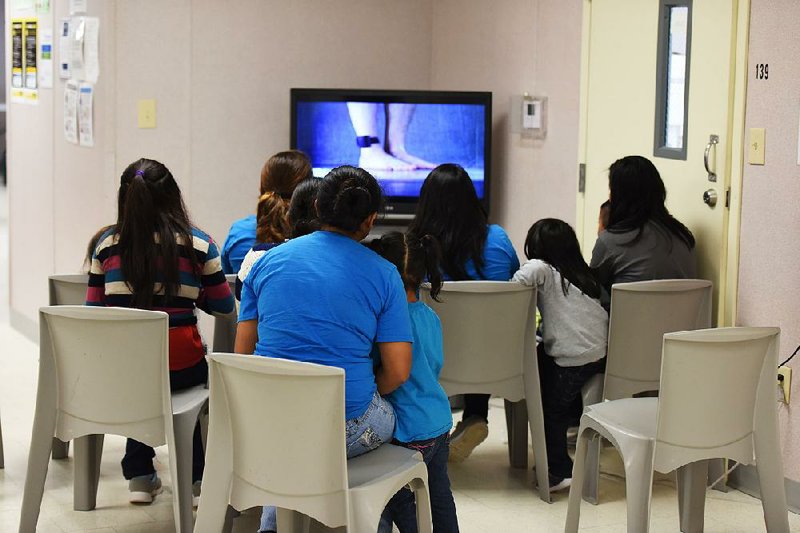The number of migrant parents entering the United States with children has surged to record levels in the three months since President Donald Trump ended family separations at the border, dealing the administration a deepening crisis three weeks before the midterm elections.
U.S. Border Patrol agents arrested 16,658 family members in September, the highest one-month total on record and an 80 percent increase from July, according to unpublished Homeland Security statistics obtained by The Washington Post.
Large groups of 100 or more Central American parents and children have been crossing the Rio Grande and the deserts of Arizona to turn themselves in, and by citing a fear of return, the families are typically assigned court dates and released from custody.
"We're getting hammered daily," said one Border Patrol agent in south Texas who spoke on the condition of anonymity because he was not authorized to speak to the news media.
Having campaigned on a promise to stop illegal immigration and build a border wall, Trump now faces a spiraling enforcement challenge with no ready solutions. The soaring arrest numbers -- and a new caravan of Central American migrants heading north -- have left him in a furious state, White House aides say.
The president is pushing once more for a reinstatement of a family separation policy in some form, which he believes is the only thing that has worked, despite the controversy it triggered.
One senior official conceded that the separations were halted to stanch political fury but ended up sending a "clear signal" that people could cross, adding, "now we're actually getting crushed."
Trump continues to criticize Homeland Security Secretary Kirstjen Nielsen and has asked Secretary of State Mike Pompeo to work with Mexico to make it tougher for Central American migrants to cross its southern border, inserting the issue into ongoing trade negotiations.
A senior Homeland Security official said Wednesday that Nielsen continues to take the lead role engaging with leaders from Central America on migration issues and has been in regular contact with the Mexican government and the transition team of President-elect Andres Manuel Lopez Obrador, who will take office Dec. 1.
The latest Homeland Security figures show 107,212 "family units" members were taken into custody during the 2018 fiscal year, obliterating the previous high of 77,857 set in 2016.
Senior policy adviser Stephen Miller is pushing for a more aggressive stance, including changes at U.S. ports of entry that would make it tougher for asylum-seeking Central Americans to gain admission.
Another option under consideration, known as "binary choice," would detain migrant families together and give parents a choice -- stay in immigration jail with their child for months or years as their asylum case proceeds, or allow their child to be assigned to a government shelter while a relative or guardian can apply to gain custody.
Some Homeland Security officials remain wary of the proposal and the potential blowback it could bring, and they lack the detention space to accommodate the record wave of parents and children coming across. U.S. Immigration and Customs Enforcement has about 3,300 detention beds at three "family residential centers," but five times as many parents and children are crossing each month. The volume has overwhelmed Border Patrol stations and prompted mass releases.
The latest Department of Homeland Security figures show U.S. agents made 396,579 arrests along the Mexico border during the government's 2018 fiscal year, a 30 percent increase over the same period in 2017, when illegal migration dropped to a 56-year low.
Separately, the U.S. government quietly reached a new agreement to keep open a 2,400-bed detention facility used to detain migrant mothers and children, in a lucrative arrangement for a private prison company and the tiny south Texas town where it's located.
Immigration and Customs Enforcement last month signed a contract with the city of Dilley, where the South Texas Family Residential Center opened in 2014. Dilley signed a contract at the same time with CoreCivic, the private prison operator that runs the detention center, the largest facility of its kind in the U.S.
The immigration agency said it was replacing an arrangement dating to President Barack Obama's administration that the Department of Homeland Security's inspector general criticized this year as violating budget guidelines and wasting money.
Immigration and Customs Enforcement spokesman Nina Pruneda said Tuesday that the agency created the agreement with Dilley in response to the inspector general's concerns, and that all other terms of the contract will remain the same.
Information for this article was contributed by Nick Miroff and Josh Dawsey of The Washington Post and by Nomaan Merchant and Astrid Galvan of The Associated Press.
A Section on 10/18/2018

